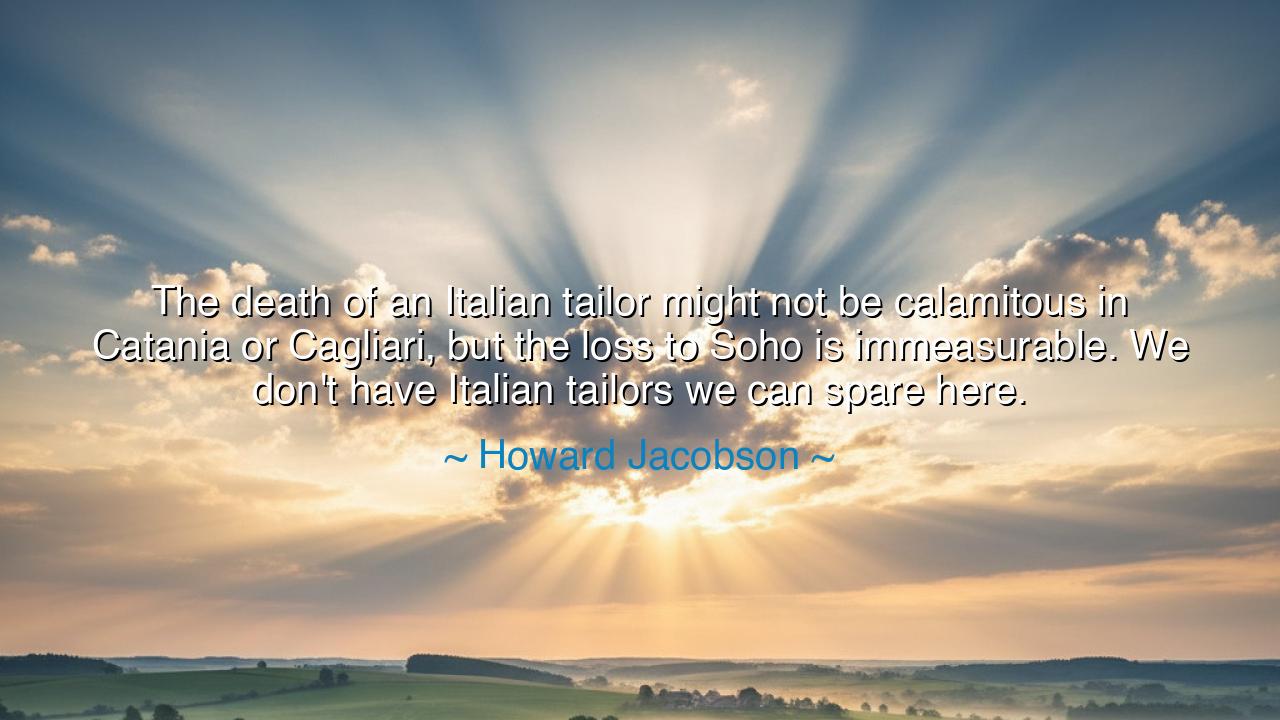
The death of an Italian tailor might not be calamitous in Catania
The death of an Italian tailor might not be calamitous in Catania or Cagliari, but the loss to Soho is immeasurable. We don't have Italian tailors we can spare here.






The writer and moral observer Howard Jacobson once wrote: “The death of an Italian tailor might not be calamitous in Catania or Cagliari, but the loss to Soho is immeasurable. We don't have Italian tailors we can spare here.” Beneath the surface of wit and irony, these words hold the quiet ache of truth — that every life, though ordinary in its birthplace, may become extraordinary in exile; that every person who leaves home and plants their skill, art, and soul in a new land becomes a thread in the tapestry of another civilization. When one such life is lost, it is not merely a craftsman who departs, but a world of care, precision, and humanity that disappears with him.
In this reflection, Jacobson speaks not only of Italian tailors but of all who carry the light of their homeland into foreign streets — the immigrant artisans, cooks, builders, dreamers, and poets who transform a city through the quiet labor of their hands. Soho, London’s heart of art and eccentricity, has long been a sanctuary for such souls. There, the Italian tailor is not simply a man who stitches fabric; he is a keeper of elegance, a bridge between cultures, a living emblem of beauty’s endurance amid chaos. To lose him is not merely to lose a trade — it is to lose a fragment of the soul that makes the city breathe.
“The death of an Italian tailor might not be calamitous in Catania or Cagliari…” — in his homeland, perhaps, such a man would be one among many, his skill common as sunlight. But in Soho, that same man is irreplaceable, for he brings with him something scarce: a tradition honed by centuries, a patience and artistry that no machine can mimic. Jacobson’s lament is not nostalgia; it is reverence. He speaks to the sacred truth that place transforms value. What is ordinary in one land may be priceless in another — and this is the quiet miracle of migration, that what the world casts aside in one corner it learns to treasure in another.
History is filled with such migrations of mastery. When the Huguenots fled France in the seventeenth century, they carried with them the secrets of silk weaving and goldsmithing. In London, their exiled hands transformed the fabric of the city — quite literally. What Paris lost, England gained. Or consider the Jewish violin makers of Cremona, whose craft, once scattered by persecution, took root in foreign soil, their violins singing across borders long after their names were forgotten. Jacobson’s tailor belongs to this lineage — a quiet hero of civilization, one of those unthanked artisans upon whose labor the beauty of cities rests.
But beneath Jacobson’s irony there also stirs grief — the awareness that modern life no longer cherishes its artisans as it once did. The Italian tailor, the baker, the cobbler, the craftsman — these were once the living pillars of the neighborhood, the ones who gave texture and soul to a community. Now, in the rush toward speed and convenience, their art withers. The “loss to Soho” is not only of one man, but of a way of life, a kind of intimacy between creation and creator, between work and worth. When such people vanish, the city becomes colder, its elegance mass-produced, its humanity diminished.
And yet, there is also in Jacobson’s words a whisper of gratitude — the recognition that diversity, when honored, enriches all who receive it. The Italian tailor in Soho is not a stranger; he is a citizen of the world. His death reminds us that the gifts of one culture become the treasures of another. The lesson is clear: wherever we live, we must protect and celebrate those who bring with them craft, care, and culture, for they are the quiet architects of belonging.
Therefore, my child of the present age, learn this truth: every craftsman, every teacher, every creator who brings beauty to the world is sacred. Do not measure worth by fame or wealth, but by the light a person gives to their corner of the earth. When such a light goes out, the darkness is greater than we think. Support the makers, the builders, the keepers of tradition — not because they are rare, but because they make life radiant.
And when next you pass by the tailor’s shop, the baker’s oven, the musician’s corner, pause and give thanks. For it is through their hands that the spirit of civilization endures. This is the meaning of Howard Jacobson’s lament: that no life devoted to beauty and craftsmanship is small, and that the true measure of a city — and indeed, of humanity itself — lies not in its monuments, but in the humble souls who stitch, shape, and sustain its heart.






AAdministratorAdministrator
Welcome, honored guests. Please leave a comment, we will respond soon